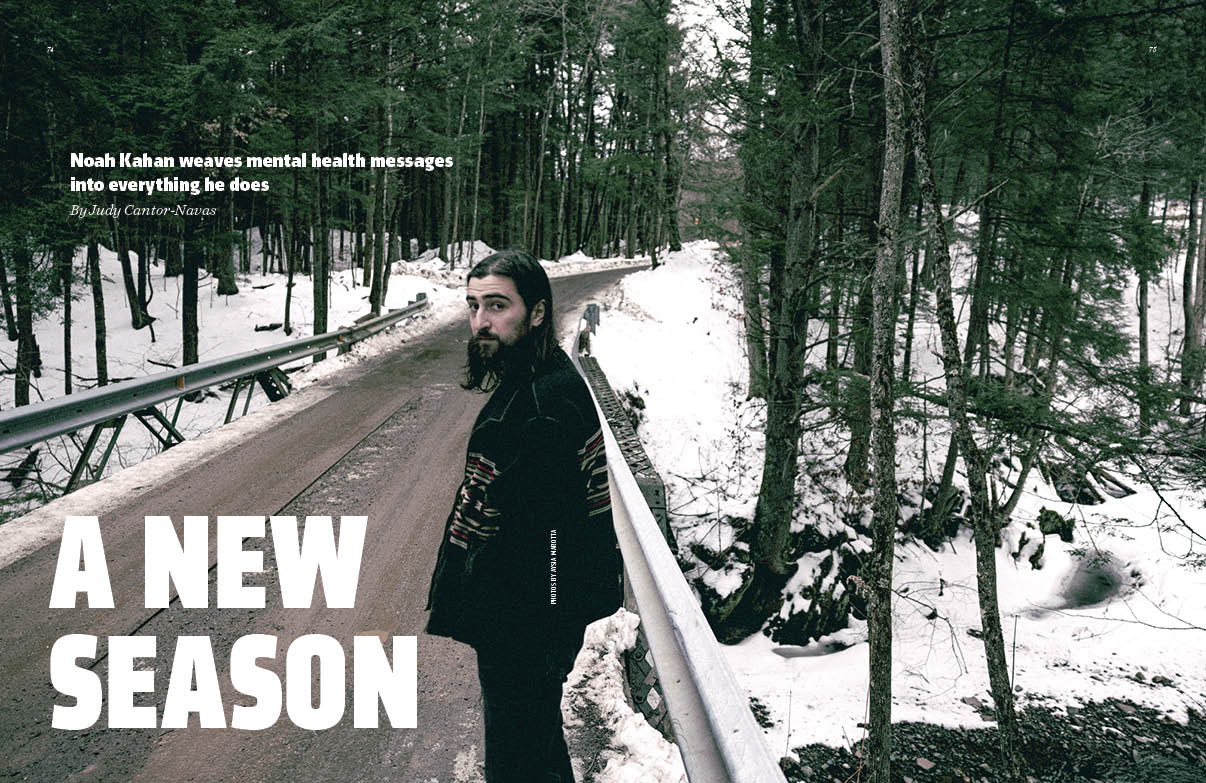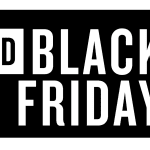JOURNAL EXCERPT: Noah Kahan Weaves Mental Health Messages Into Everything He Does

EDITOR’S NOTE: Below is an excerpt from a story in our Winter 2023 issue of No Depression. You can read the whole story — and much more — in that issue, here. And please consider supporting No Depression with a subscription for more roots music journalism, in print and online, all year long.
This year, Noah Kahan won’t see much of the season of the sticks. It’s the time of year in Vermont, he says, when “there’s that biting cold but there’s nothing to look at outside except for the space between the trees; the sticks are the most prominent feature that you see. The light is dim, usually gray.
“It’s setting you up for the depression you’ll feel all winter,” he adds. “It’s like a little appetizer.”
As leaves were about to fall off those New England trees, however, Kahan was sitting in a hotel room in Orlando, Florida, about to spend a sweaty afternoon off with his band at Disney World. The massive success of his 2022 album, Stick Season, and its 2023 expanded version, Stick Season: We’ll All Be Here Forever, has fueled a continuous tour with more than 70 concerts from late 2023 to July 2024, including stops at Madison Square Garden and the Hollywood Bowl, Wembley Arena in London and L’Olympia in Paris, as well as other massive venues across Canada, Mexico, and Australia.
Tickets are already sold out for many of the shows, which fans often describe as a collective singalong and catharsis of music, tears, and laughter. Kahan, who has become an advocate for open discussion about mental health, is also known for talking between songs as confessionally as if he were in a therapist’s office, or sometimes a comedy club. While Rolling Stone has referred to him as a “hot folkie,” the 26-year-old has described himself to audiences as a “a Jewish Ed Sheeran” or “Prozac Lin-Manuel Miranda.”
Oh I was raised out in the cold.
If the sun don’t rise
’Til the summertime
Forgive my northern attitude
— “Northern Attitude”
Stick Season’s literary vignettes spring from the songwriter, singer, and guitarist’s emotionally wrought and wry observations about going home again “on roads named after high school friends’ grandfathers” and the cycles of life that come into stark relief over decades of staying in one place. In a way, it’s a concept album about Vermont, particularly resonant among those who have spent time in one of the small-town communities in the state where everyone knows your name and has your back.
“I wanted people to see Vermont as I see it. Not just maple syrup and people think it’s in Canada, but that it’s a nuanced experience,” says Kahan, who was wearing a T-shirt imprinted with photos of his now famous-to-fans German shepherd, Penny, and a baseball cap with the logo of his mental health awareness foundation, The Busyhead Project.
“I wanted people to come into this world,” he explains. “Like when I grew up reading John Steinbeck. In East of Eden, my favorite book, Steinbeck talks about the Salinas Valley, and he waxes on about that for a bunch of pages. At first, I thought, this is kind of boring, but then I felt myself in this world, and I thought it was so cool to disconnect from my world and be brought somewhere else. And I wanted to do that with this record. I think it’s allowed people to step away from themselves for a second and be transported to a different place. I think that kind of escape can be a solace for people.”
Kahan, who spent his childhood in Strafford, Vermont (a town of just more than 1,000 people), and went to high school in New Hampshire, was already an artist-to-watch at 17, when his debut pop single, “Young Blood,” earned him a contract with Mercury Records/Republic Records (which is still his record label). On songwriting retreats in Los Angeles and Nashville, he started to experience the push and pull of the place he grew up, feelings he explores in “Homesick,” a song with which he’s been closing recent shows.
“All I ever wanted was to be home,” he recalls. “I would fly home every couple of weekends and I would feel like, ‘Oh thank god I’m back, I’m out of there.’ I don’t think there’s a much more beautiful feeling than driving through your hometown when you first get there and seeing your old friends on that first day. There’s also nothing more depressing than driving through your hometown when you’ve been there for two weeks and being like, ‘What the fuck am I still doing here?’ It can go both ways for sure. You’ll always have that connection to your hometown, whether it’s something that you want to have or not. Sometimes it feels like a toxic relationship with an ex … that constant back and forth of hating it and loving it.”
Like others around the world, Kahan went home during the COVID pandemic. He wrote and recorded most of Stick Season in Vermont, which led to a rootsier project — musically and literally — than his previous work.
“A lot of people were moving back with their parents and that meant being shut off from the social structure and the work structure that they’d had for years,” Kahan recalls. “But it was just like going back to a younger version of yourself, going back there without their own lives. This music speaks to that feeling, and to kind of looking back. And it also speaks to being stuck.”
Don’t let this darkness fool you
All lights turned off can be
Turned on
I´ll drive, I´ll drive all night
I´ll call your mom
Oh dear don’t be discouraged
I’ve been exactly where you are
— “Call Your Mom”
On Oct. 10, which was Global Mental Health Day, Time published an essay by Kahan titled “Putting Words to My Mental Health Struggles Saved Me,” in which he writes about having panic attacks at 10 years old and episodes of extreme anxiety and depression from a very young age, with which he continues to struggle.
Kahan’s songs often acknowledge these ups and downs, and can offer, in Joni Mitchell’s parlance, a kind of “Both Sides Now” consideration of life’s complexities. The spare, fraught “Call Your Mom” is a song that has often brought tears, for Kahan on stage as well as for people in the crowd. The song expresses messages both about the power of support for someone in distress and the possibility of losing someone to suicide or overdose. Fans have even taken to printing the lyrics on T-shirts and wearing them to Kahan’s concerts.
“I think we got over the hump where it was really, really hard for me to play at all,” Kahan says of the song, conceding he has “been on both sides of that conversation.”
“The thing is that if you look out and see somebody crying, that’s enough of an indication that you should play it. Because its allowing someone to be vulnerable. All I care about when I think about what songs I want to play is, is this going to connect with somebody out there, is it going make somebody who feels lost who isn’t ready to admit that they feel lost, come to terms with that?”
Kahan created The Busyhead Project last May to support organizations that provide mental health treatment and improve access to treatment in underserved communities. The foundation has since raised $1.9 million through a percentage of concert ticket proceeds and donations.
“I always hoped that my music and the lyrics would be enough to advocate and be enough to raise awareness or get real about mental health,” Kahan says. “But I wanted to go beyond that and show people what it’s like to be a musician and be in this industry, and be struggling this way and kind of explore how I got here and why it’s important to me. An important thing for me to talk about is the privilege I had growing up in terms of being able to go to therapy, to be in a family that was open about mental health, to be in a good school system where people paid attention to me, and still to end up with these feelings in my adulthood that feel unresolved. I wanted to express that pain and mental illness don’t see boundaries of wealth or privilege, or circumstance or sexual orientation. I wanted to bring that perspective in there. I wanted to talk about what it was like to be here in a real way, and to be grappling with mental health even as I’ve had success in my career and opportunities in my life.
“We all see ticket prices and we see shows sell out and what it means is that I get to make some money,” he adds. “And I’ve always felt philosophically like if you make money, you should be giving it to others and try to do good with it. It’s kind of putting my money where my mouth is.”
I’m over the bridge
A minute from home,
But feel so far from it
The car’s in reverse, I’m
Grippin’ the wheel
I’m back between villages,
And everything’s still
— “The View Between Villages”
Kahan’s 2024 tour ends (for now) in the Northeast, at Boston’s Fenway Park, where he’ll perform two already-sold out shows in July. Vermont is, conspicuously, not on the tour itinerary. Kahan is already nodding before the question is out. He seems to be wishing for a better answer.
“It’s surprising to me that I’m even able to play arenas,” he says. “And Vermont isn’t known for its sports teams.
“I definitely just want to go play for as many people as I can in Vermont,” he says. “It didn’t work for the routing of this tour, but I want to do it, I want to play free shows, I want to do an open-mic night or something. If there was a venue I could play there we would have booked it. Ticket prices in a smaller venue would be even more astronomically expensive and scalpers would be all over it.
“But we’re going to make something happen,” he insists. “Vermont will always be there for me. It’s been a part of my story and it will always be a part of my story.”






